"The Elephant Whisperers" Wins Best Documentary Short Subject at Oscars 2023
TAMIL DOCUMENTARY FILM WON THE OSCAR
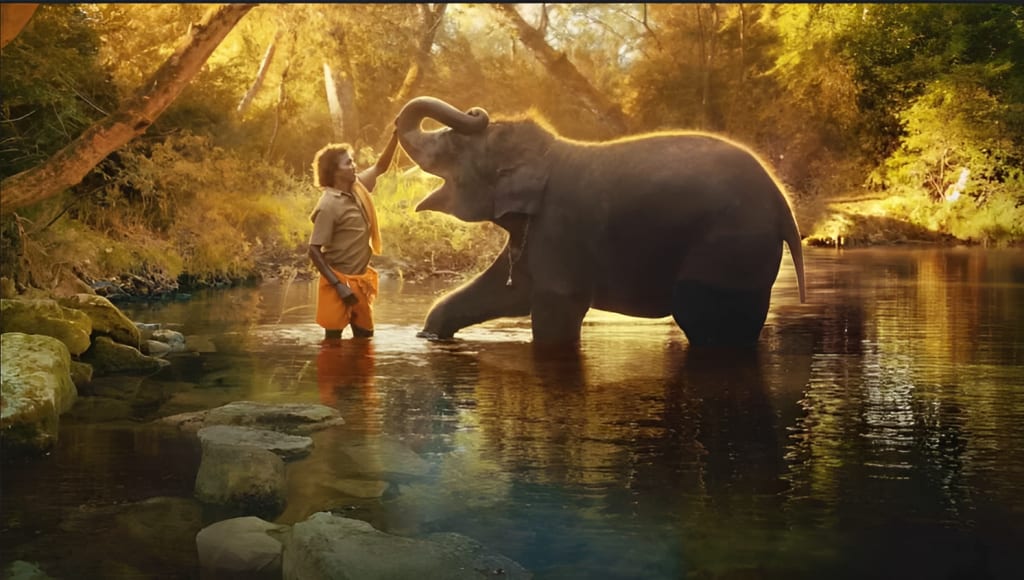
The director Kartiki Gonsalves in her acceptance speech went on to thank the Academy, producer Guneet Monga, her family and dedicated the win to her 'motherland India'
Kartiki Gonsalves and Guneet Monga’s Netflix documentary short, The Elephant Whisperers, has won the Oscar for Best Documentary Short category at the 95th Academy Awards. The film was competing against Haulout, How Do You Measure a Year?, The Martha Mitchell Effect and Stranger At The Gate. Director Gonzalves dedicated the award to ‘my motherland, India’. Guneet, in an Instagram post, wrote, “Tonight is historic as this is the first ever Oscar for an Indian production…”
Produced by Achin Jain and Guneet Monga, and directed by Kartiki Gonsalves, the 41-minute short follows the family from Tamil Nadu’s Mudumalai Tiger Reserve who end up adopting two orphan baby elephants. What was special about this India short was that it happened to be filmmaker Gonsalves’ directorial debut. Earlier, speaking to The Indian Express, Gonsalves had shared a little about the making of the short and said, “I followed Raghu’s story for five years, and had about 450 hours of footage. There are thousands of Raghu baths in there, so many hours of him eating food or playing. But you need to be patient (with something like this), and you get scenes like the one where Bellie tells Ammu to sit down next to her. These are intimate moments, which cannot be planned.”
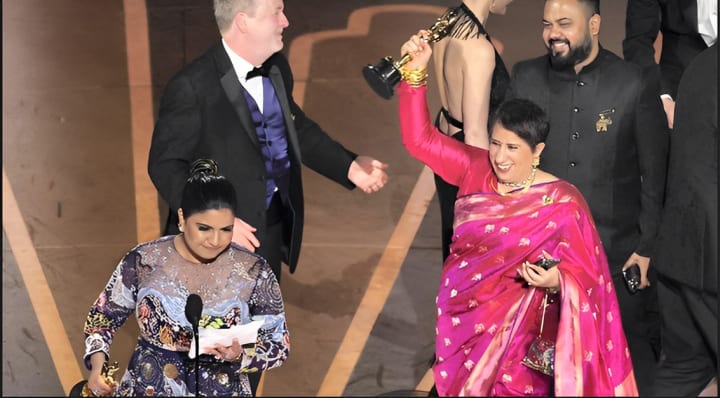
Set in the 100-year-old Theppakadu Elephant Camp, one of the oldest elephant rehabilitation camps in Asia, The Elephant Whisperers is ultimately a love-story about the power of community. Even though the narrative, fuelled largely by voiceovers, is fairly straightforward, the storytelling manages to be simultaneously gentle and persuasive. Gonsalves succeeds in striking this delicate balance only because of her compelling subjects. Bomman and Bellie are endlessly watchable, boasting a magnetic screen presence that makes it difficult to look away from the screen even for a second. Raghu is an equally adorable subject, drawing the audience in with his vulnerability and playful nature. Even more rewarding are the couple’s interactions with Raghu who responds to their unconditional love and affection with a child-like enthusiasm.
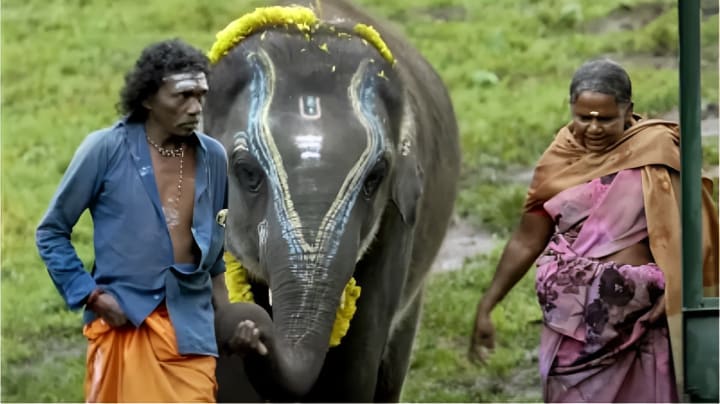
Over the course of the documentary, Bomman and Bellie also become parents to Ammu, another baby elephant who is placed under their aegis. The much-younger Ammu’s arrival unlocks Raghu’s sibling jealousy that is soon extinguished when he slowly learns to look after Ammu the way Bomman and Bellie protect him.
In that sense, The Elephant Whisperers — produced by Guneet Monga’s Sikhya Entertainment — is elevated by its stunning cinematography (by Gonsalves, Krish Makhija, Anand Bansal, and Karan Thapliyal). The camera constantly captures the intricacies of human-elephant life in real-time, immersing audiences in the environment as first-hand witnesses. When Bellie admits that she felt an instant maternal instinct toward Raghu when she first met him, we are inclined to believe it when we see them share the same frame. The language of care and concern is beautifully embedded in the camera movements. Take for instance, a winsome sequence that observes Bomman and Bellie taking turns to feed Raghu. Raghu refuses to eat the millet balls Bellie lovingly offers him, throwing it on the ground in a swift motion. After a point, it ceases to matter that he is an elephant and his caretakers are human. What we see instead are two parents nurturing their child.
Like Shaunak Sen’s sensational All That Breathes, The Elephant Whisperers builds itself around the argument that humans and animals have always been predisposed to coexist with each other. Once again, the magnificent camerawork underlines that point, illustrating the pristine forest landscape and its varied inhabitants in vivid detail (the film is largely shot in natural light). We see owls, butterflies, tigers, and hens in close proximity with Bomman, Bellie, and Raghu. Cranes rest on wild buffaloes, wild pigs roam around on the paths of the elephants, and monkeys eat the leftover food of the elephants.
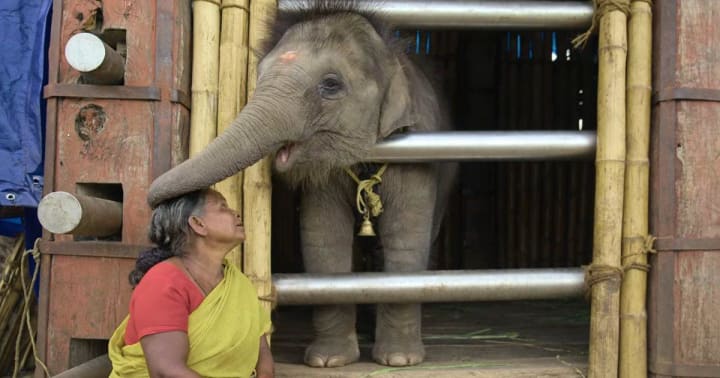
The storytelling is similarly emotionally attentive. Much of the beauty of The Elephant Whisperers lies in the understated coming-of-age of the film’s narrative that draws ample parallels between humans and animals. One of the film’s undeniable highlights is Gonsalves’ masterful framing of Bomman and Bellie’s trajectory from caretakers to companions. In the initial moments of The Elephant Whisperers, we see snippets of Bomman and Bellie’s courtship. Bellie frequently teases Bomman and he in turn, blushes at her attention when they share a meal together. Most of the time that the couple are around each other is spent in dividing household chores as they go about their days gathering food and water for Raghu. Through it all, Gonsalves’ keen eye succeeds in conveying just how much they enjoy each other’s company — in caring for Raghu and Ammu, they also learn to look after one another.
In fact, it’s admirable that Gonsalves doesn’t resort to much spoonfeeding about Bomman and Bellie’s impending marriage, instead letting the audience slowly connect the dots. In fact, Gonsalves employs their wedding to spotlight the social mores of tribal life, reveling in the community’s communal ways and their animist belief systems. We see women gather around a bonfire and sing folk songs on the eve of Bomman and Bellie’s wedding while the men dress up the elephants; the celebratory mood reinforced by the smiles on everyone’s faces. That Bomman and Bellie get married in the forest they call home, effectively completing the integration of their blended family, feels impossibly poetic. (A family portrait of the newly-weds with Raghu and Ammu is worth the price of admission alone.)
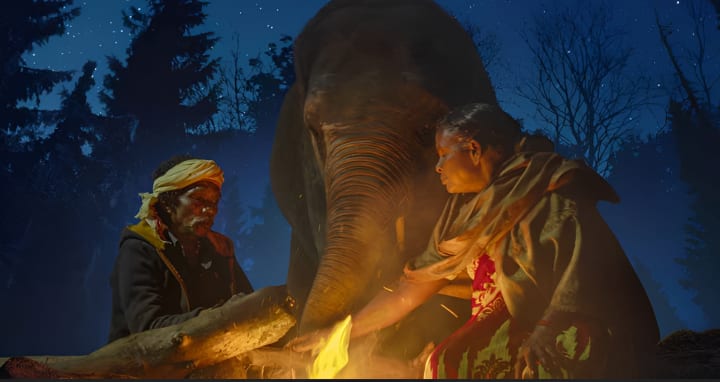
Even then, there’s no preachy monologue about shattering the stigma of widow remarriage or about the importance of foregrounding tribal communities that are rarely represented onscreen. For this is the kind of film that believes in showing more than telling. In being an example of the unconditional love and compassion that is capable of overwriting grief and suffering, The Elephant Whisperers champions the dignity of — all kinds of — life.
About the Creator
Mark Xavier
typing...






Comments
There are no comments for this story
Be the first to respond and start the conversation.